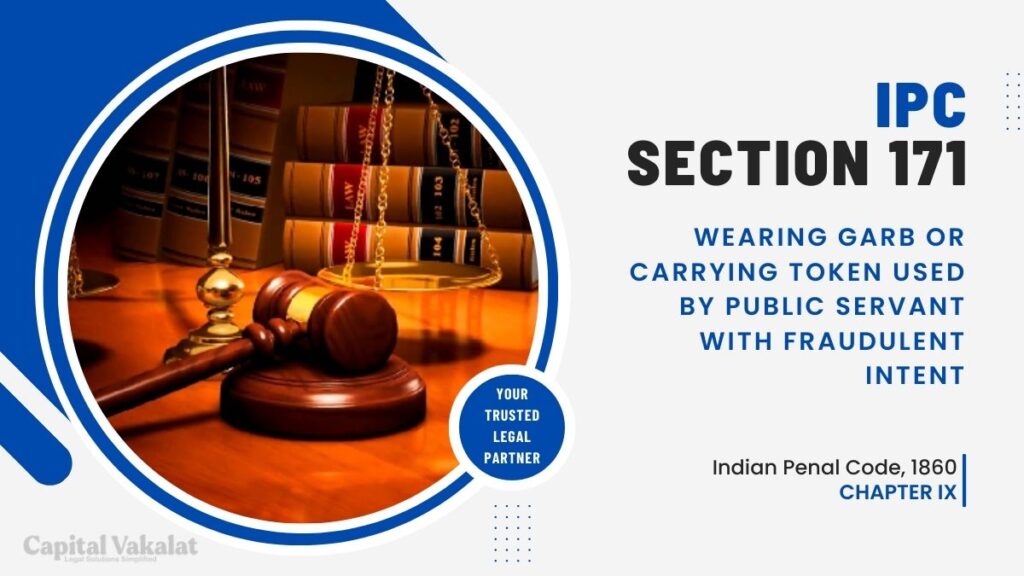In the realm of legal statutes, Section 171 of the Indian Penal Code (IPC) is one that deals with a fascinating yet often overlooked aspect of criminal behavior. It focuses on individuals who don the attire or carry tokens associated with public servants with fraudulent intent. In this article, we will delve into the nuances of Section 171 IPC, examining its provisions and implications. Let’s unravel the intricacies of this legal provision step by step.

The Indian Penal Code, originally enacted in 1860, is a comprehensive legal framework that defines various criminal offenses and their penalties. Section 171 of the IPC specifically addresses a unique form of misconduct involving the fraudulent use of public servant attire or tokens.
2. Understanding Section 171 IPC
Section 171 of the IPC is a provision that deals with the impersonation of public servants. It is divided into several sub-sections that describe various scenarios where individuals might impersonate public servants with deceitful intentions. These sub-sections categorize different types of offenses and prescribe punishments accordingly.
3. Elements of the Offense
To establish an offense under Section 171 IPC, certain key elements must be met. These include the wearing of garb or carrying a token associated with a public servant, doing so with fraudulent intent, and causing another person to believe in the authenticity of the impersonation.
4. Punishments and Consequences
The punishments for offenses under Section 171 IPC can vary depending on the specific sub-section under which the accused is charged. Penalties may include fines and imprisonment, with the severity of the punishment determined by the nature and gravity of the offense.
5. Case Studies
To gain a better understanding of how Section 171 IPC is applied in real-life scenarios, let’s explore a few notable case studies where individuals were charged under this provision.
6. Legal Implications
The legal implications of Section 171 IPC go beyond just criminal penalties. It also impacts public trust, integrity, and the functioning of government institutions.
7. The Historical Perspective
This section delves into the historical context of Section 171 IPC, exploring the reasons behind its incorporation into the Indian Penal Code.
8. Challenges and Controversies
Like any legal provision, Section 171 IPC is not without its challenges and controversies. This section discusses some of the debates and issues associated with this law.
9. How Section 171 IPC Relates to Public Order
Understanding the link between Section 171 IPC and the maintenance of public order is crucial to appreciate its significance in the legal landscape.
10. Significance of Public Trust
Section 171 IPC plays a vital role in upholding public trust in government institutions and public servants. We examine how it contributes to maintaining the faith of the citizens.
11. Preventive Measures
This section explores measures that can be taken to prevent the fraudulent impersonation of public servants and protect the integrity of government institutions.
12. Conclusion
In conclusion, Section 171 IPC is a crucial legal provision that safeguards public trust and the integrity of public servants. By penalizing those who impersonate public officials with fraudulent intent, it upholds the sanctity of government institutions.
In this article, we have explored the intricacies of Section 171 IPC, shedding light on its purpose, elements, consequences, and historical significance. This legal provision serves as a safeguard against fraudulent impersonation of public servants, ensuring that public trust and the sanctity of government institutions are upheld. If you have any more questions or need further clarifications, please refer to our FAQs section.
Frequently Asked Questions
Are there any exceptions to the application of Section 171 IPC?
Certain exceptions may apply, such as lawful theatrical performances or educational activities. However, the intent to deceive must be absent.
How does Section 171 IPC contribute to public order?
By discouraging fraudulent impersonation of public servants, Section 171 IPC helps maintain public order and trust in government institutions.
Can a misunderstanding lead to a Section 171 IPC charge?
Misunderstandings may occur, but the prosecution must prove fraudulent intent for a valid charge under this provision.
Are there any recent amendments to Section 171 IPC?
As of the knowledge cutoff date in September 2021, no significant recent amendments to Section 171 IPC were reported.